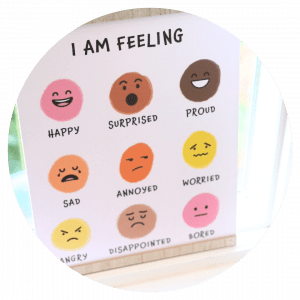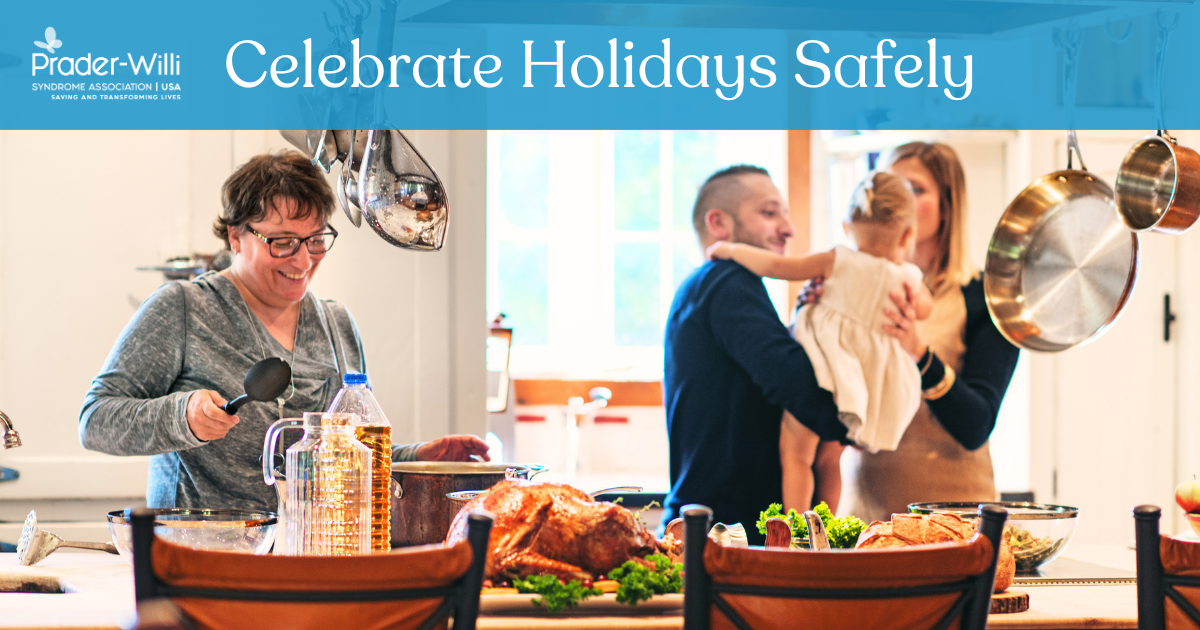by Katherine Crawford, former PWCF Family Support Coordinator; Updated by Lisa Graziano, M.A., PWCF Education and Training Consultant
Holidays are a time for gathering, connecting, and celebrating – but are also typically centered on food, which often places enormous stressors on families of a child or adult with PWS. We hope the following tips make your holiday celebration safer, less stressful, and more enjoyable for every member of your family.
Always supervise your loved one because when everyone is watching, no one is watching.

Serious food-related health issues, including death, occur during holiday gatherings and other food-centric get-togethers more often than at any other time because it is presumed there are so many people at the event that someone will notice our loved one taking unauthorized food. Make a plan for rotating supervision throughout the entire event so that no single individual is overloaded with responsibility.
Have a clear, written plan prior to the event.

Make sure that the plan is created with your loved one well in advance of the event. Creating a plan is always more effective when it’s done with the individual with PWS which might sound like, “We’re going to Aunt Sue’s for Christmas! There will be a buffet table and lots of food so we need to make a plan to keep you safe and so we all have fun. You will have plenty of food, no worries! Do you want to Mom to fix your plate or do you want Dad to fix your plate?” Factor in the answer into your plan.
Plan your visits strategically.

If Aunt Sue always has a big buffet followed by an open cookie and dessert table, you might time your visit to include just one or the other. Or maybe Aunt Sue is amenable to changing her food serving plan so that you and your family can stay longer. Otherwise, it might be best to invite Aunt Sue to a smaller Christmas dinner at a later date at your own house where food security can be more easily maintained.
Define the specific behaviors you want to see as well as the specific behaviors you don’t want to see.

“We think that ‘managing your body well’ is when you use a friendly voice, when you play gently with your cousins, and when you ask first for anything you’d like to play with or eat. What would you add to the list of things that describe ‘managing your body well’?” Factor these into your plan. “We think that ‘unwanted behavior’ and ‘your body is not safe’ are when you yell or cry or take any thing or any food without first asking and receiving permission.’ What would you add to the list of things that describe ‘unwanted behavior or not being safe’?” Factor these into your plan.
Additional Tips:
- Create a food plan with your child or adult. If the dinner is a buffet, discuss in unambiguous terms how you and your loved one will go through the line.
- Reward good behavior. Be sure to include rewards for good behavior. Good behavior might be defined as sitting patiently at the table while the parent or guardian prepares the meal, cutting food into small pieces before eating it, and practicing turn-taking in conversations.
- Define what will occur if there is unwanted behavior. For example, “If there is an unwanted behavior or you are not being safe with your body, our plan is to go outside of Aunt Sue’s house and sit in the car. Would you rather we drive straight home and miss the rest of the party, or would you prefer to regain control of your body and go back into the party? Mom or Dad will be the decider of whether your body is safe and if/when it is time to return to the party.”
- Create a schedule of events with your child or adult. Discuss the schedule of the day in terms of order of events rather than specific times.
- Factor into the plan everything you think could be an “issue,” and talk about it with your child or adult. Give preferred “win-win” choices about everything. Finalize the entire plan with your loved one. It is far better to address everything beforehand and include it in the plan than it is to hope there won’t be a problem. Whatever you write in your plan, you must follow it otherwise making behavior plans in the future will be ineffective.
- After the event, reward and take time to take care of YOU. No one expects a car to run on empty, and the same is true of people. When you are at your best, you are better able to help your loved one with PWS. Do what it takes to refuel your energy. If you notice stress taking a toll on you, find a way to do something that eases that stress. For some people, that means take a 15 minute walk or take a warm bath at the end of the day. For others, that might mean creating a date night with your spouse or a night out with friends.
PWSA | USA wishes you and your family a wonderful and safe holiday season!
Share this!





 Jennifer Bolander has been serving as a Special Education Specialist for PWSA (USA) since October of 2015. She is a graduate of John Carroll University and lives in Ohio with her husband Brad and daughters Kate (17), and Sophia (13) who was born with PWS.
Jennifer Bolander has been serving as a Special Education Specialist for PWSA (USA) since October of 2015. She is a graduate of John Carroll University and lives in Ohio with her husband Brad and daughters Kate (17), and Sophia (13) who was born with PWS. Perry A. Zirkel has written more than 1,500 publications on various aspects of school law, with an emphasis on legal issues in special education. He writes a regular column for NAESP’s Principal magazine and NASP’s Communiqué newsletter, and he did so previously for Phi Delta Kappan and Teaching Exceptional Children.
Perry A. Zirkel has written more than 1,500 publications on various aspects of school law, with an emphasis on legal issues in special education. He writes a regular column for NAESP’s Principal magazine and NASP’s Communiqué newsletter, and he did so previously for Phi Delta Kappan and Teaching Exceptional Children. Evan has worked with the Prader-Willi Syndrome Association (USA) since 2007 primarily as a Crisis Intervention and Family Support Counselor. Evans works with parents and schools to foster strong collaborative relationships and appropriate educational environments for students with PWS.
Evan has worked with the Prader-Willi Syndrome Association (USA) since 2007 primarily as a Crisis Intervention and Family Support Counselor. Evans works with parents and schools to foster strong collaborative relationships and appropriate educational environments for students with PWS. Dr. Amy McTighe is the PWS Program Manager and Inpatient Teacher at the Center for Prader-Willi Syndrome at the Children’s Institute of Pittsburgh. She graduated from Duquesne University receiving her Bachelor’s and Master’s degree in Education with a focus on elementary education, special education, and language arts.
Dr. Amy McTighe is the PWS Program Manager and Inpatient Teacher at the Center for Prader-Willi Syndrome at the Children’s Institute of Pittsburgh. She graduated from Duquesne University receiving her Bachelor’s and Master’s degree in Education with a focus on elementary education, special education, and language arts. Staci Zimmerman works for Prader-Willi Syndrome Association of Colorado as an Individualized Education Program (IEP) consultant. Staci collaborates with the PWS multi-disciplinary clinic at the Children’s Hospital in Denver supporting families and school districts around the United States with their child’s Individual Educational Plan.
Staci Zimmerman works for Prader-Willi Syndrome Association of Colorado as an Individualized Education Program (IEP) consultant. Staci collaborates with the PWS multi-disciplinary clinic at the Children’s Hospital in Denver supporting families and school districts around the United States with their child’s Individual Educational Plan. Founded in 2001, SDLC is a non-profit legal services organization dedicated to protecting and advancing the legal rights of people with disabilities throughout the South. It partners with the Southern Poverty Law Center, Protection and Advocacy (P&A) programs, Legal Services Corporations (LSC) and disability organizations on major, systemic disability rights issues involving the Individuals with Disabilities Education Act (IDEA), Americans with Disabilities Act (ADA), and the federal Medicaid Act. Recently in November 2014, Jim retired.
Founded in 2001, SDLC is a non-profit legal services organization dedicated to protecting and advancing the legal rights of people with disabilities throughout the South. It partners with the Southern Poverty Law Center, Protection and Advocacy (P&A) programs, Legal Services Corporations (LSC) and disability organizations on major, systemic disability rights issues involving the Individuals with Disabilities Education Act (IDEA), Americans with Disabilities Act (ADA), and the federal Medicaid Act. Recently in November 2014, Jim retired.